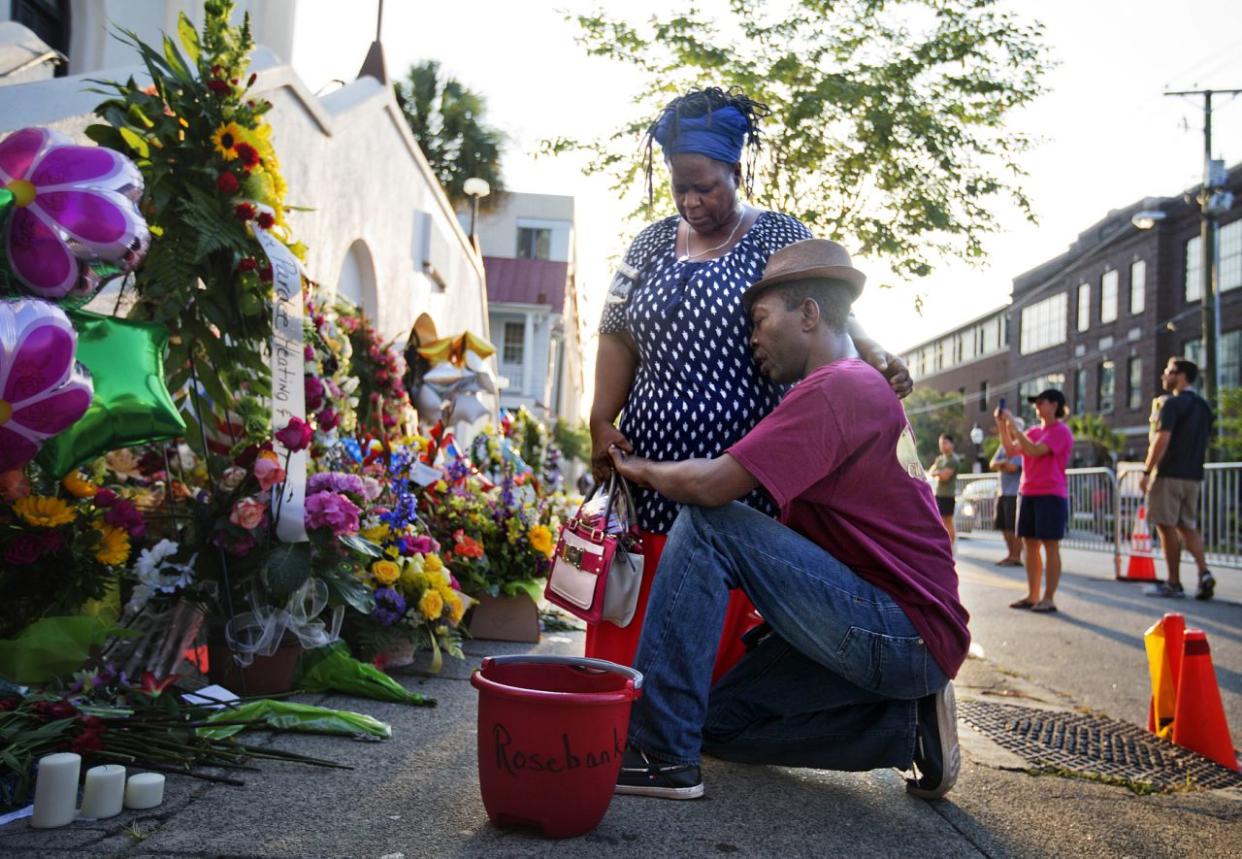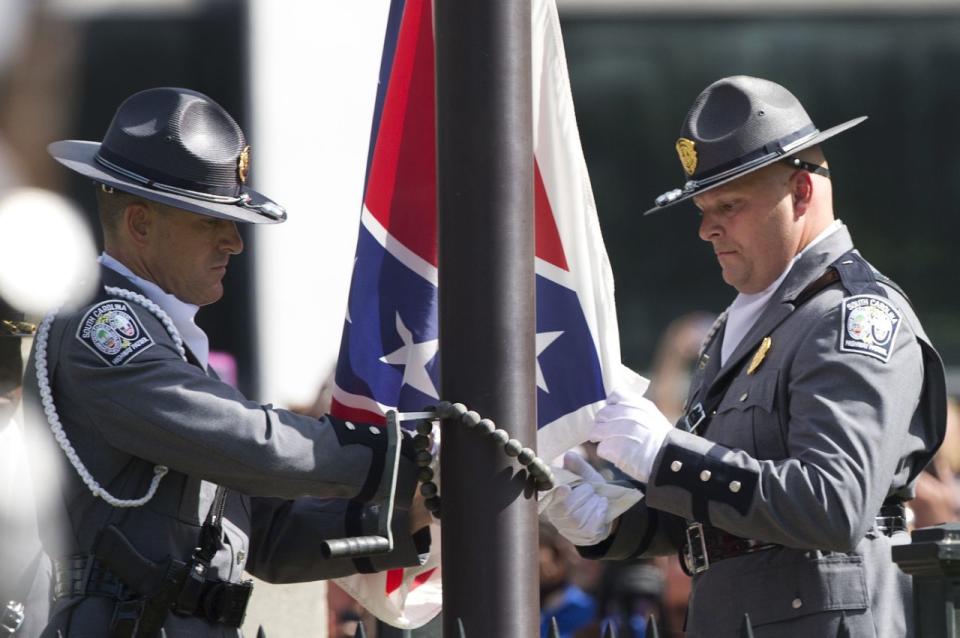16 places that shaped the 2016 election: Charleston, S.C.

By Nov. 9, the votes will have been cast and counted, there will be a winner and a loser, and the country will begin a slow return to normal. Historians will have their say on the outcome, but all of us who have lived through this election will carry away indelible memories of a shocking year in American history: of a handful of ordinary people, swept up in the rush of history; of a series of moments on which the fate of the nation seemed, at least briefly, to turn; and of places on the map that became symbols of a divided nation. As we count down to Election Day, Yahoo News has identified 16 unforgettable people, moments and places.
Dylann Roof, the 21-year-old white supremacist who allegedly shot up a Bible study class in a Charleston, S.C., church last year, killing nine black parishioners, could hardly have chosen a more powerfully symbolic venue for his attack. Emanuel AME Church is one of the oldest black churches in the South, dating back to 1816, and Booker T. Washington and Martin Luther King Jr. were among those who spoke from its pulpit. The events on the evening of June 17 put “Mother Emanuel,” as it is often called, at the center of an increasingly urgent national conversation about race relations, stretching back to the death of Florida teenager Trayvon Martin in 2012 and forward to this year’s presidential campaign.
It was the death of Martin — and especially the acquittal in 2013 of his killer, George Zimmerman — that set the stage for the emergence of the Black Lives Matter movement. And it was reading about the case that led Roof, an unemployed dropout, to the neo-Nazi websites that inspired his alleged attack, which investigators believe was intended to set off a white-against-black race war.
The killings were every candidate’s worst nightmare, an unexpected, emotionally charged event with the potential to blow up a campaign with one ill-considered quote. Texas Gov. Rick Perry, with his unerring instinct for wandering into minefields, referred to it as an “accident,” which his aides quickly scrambled to correct to “incident.” Several of his rivals, including Louisiana Gov. Bobby Jindal, tried to characterize the massacre as an attack on religion, rather than what it was, an attack on African-Americans.
Hillary Clinton, unsurprisingly, saw the killings as an argument for more gun control. In a speech last winter, she said that extending the waiting period for a gun sale “just one more day” would have kept Roof from (legally) acquiring the .45-caliber Glock he allegedly used. An investigation by FactCheck.org later concluded that Roof’s minor criminal record for drug possession wasn’t caught in his background check as a result of a clerical error; lengthening the waiting period, as Clinton advocates, would not have changed the outcome.

But it was photos of Roof posing with Confederate memorabilia that set off one of the most heated exchanges of the 2016 race, forcing candidates who weren’t able to hide from reporters to take a stand on displaying the rebel flag. South Carolina Gov. Nikki Haley acted quickly to remove the flag from the statehouse grounds, and demands quickly mounted to do the same elsewhere in the South. Republican candidates including Ted Cruz, Scott Walker, Rick Santorum and Mike Huckabee unanimously took the bold, courageous position that it wasn’t their job to tell the people of other states what to do. Donald Trump, who had announced his candidacy just the day before the shootings, staked out the clearest position, and it was one that, in hindsight, seems surprising: “I would take it down,” he said. “I think they should put it in a museum.”
A year and a half later, it is Haley who has paid a political price; as Politico wrote, “once floated as a veep choice, [she] is no longer mentioned in elite GOP circles.” Trump, for his part, managed to put his apostasy behind him; his win in the South Carolina primary was a key victory in his path to the nomination. — By Jerry Adler
9 killed at church shooting in Charleston, S.C
Dylann Roof, 21, shot and killed nine African-American church members during a Bible study group inside the Emanuel African Methodist Episcopal Church in Charleston, S.C. >>>
Confederate flag protest in South Carolina
The Confederate flag was lowered from the grounds of the South Carolina Statehouse to the cheers of thousands, ending its 54-year presence there and marking a stunning political reversal in a state where many thought the rebel banner would fly indefinitely. >>>
Funeral services for Sen. Clementa Pinckney
South Carolina State Sen. Clementa Pinckney’s funeral took place at the College Charleston TD Arena where President Obama delivered the eulogy. >>>
Live blog: 9 killed in SC church shooting
A white gunman opened fire during a prayer meeting inside a historic black church in downtown Charleston, S.C., on June 17, 2015, killing nine people in what officials describe as a hate crime. >>>
Denmark Vessey and a battle over history in Charleston
How the attempt to honor a former slave resulted in an ugly fight within the Charleston community. >>>
The ‘powerful’ 8-month journey that helped Hillary Clinton craft a new message
Hillary Clinton’s presidential campaign entered a new phase on Tuesday evening at an emotional event at a Baptist church in Columbia, where she linked her campaign platform with a powerful appeal to the Black Lives Matter movement. >>>
Charleston church massacres reignites gun control debate
In the wake of the mass shooting at a historic black church in Charleston, S.C., gun control advocates called for a national debate on America’s gun laws, while gun rights activists said the massacre could’ve been prevented had the victims been armed. >>>
So inspired by the grace shown by the Simmons family and all the victims' families in Charleston. #HateWontWin pic.twitter.com/jMS0SDUYui
— President Obama (@POTUS) June 26, 2015
Heartbreaking news from Charleston – my thoughts and prayers are with you all. -H
— Hillary Clinton (@HillaryClinton) June 18, 2015







